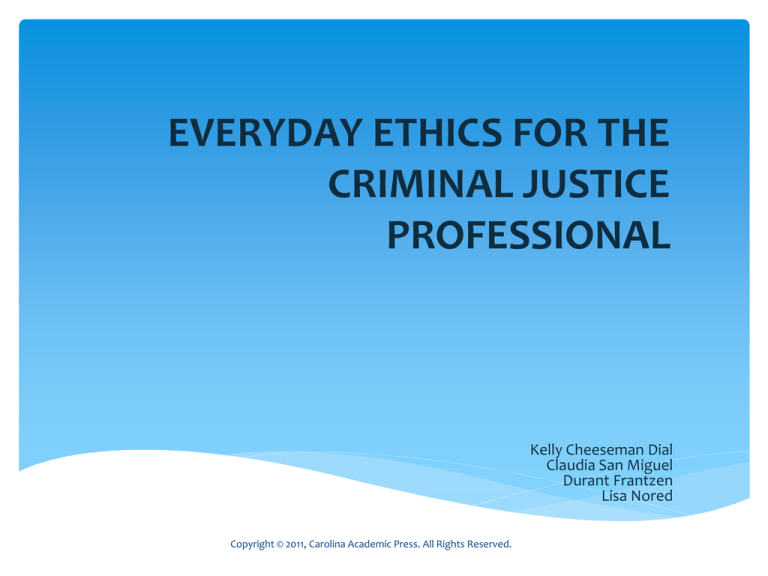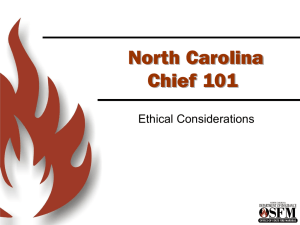
EVERYDAY ETHICS FOR THE
CRIMINAL JUSTICE
PROFESSIONAL
Kelly Cheeseman Dial
Claudia San Miguel
Durant Frantzen
Lisa Nored
Copyright © 2011, Carolina Academic Press. All Rights Reserved.
CHAPTER 1
An Introduction to Everyday Ethics in Criminal Justice
Copyright © 2011, Carolina Academic Press. All Rights Reserved.
Chapter Objectives
The student will understand the meaning of ethics
The student will understand how ethics relates to the criminal
justice system
The student will learn to define the word ethics
The student will differentiate between the words ethics and
morality
The student will understand the importance of ethics for criminal
justice professionals
Copyright © 2011, Carolina Academic Press. All Rights Reserved.
Introduction
Careful consideration of ethical dilemmas are an important part of forming an ethical
basis from which to operate. Braswell et al. (2008) discuss five goals that should be
included in examining crime, justice and ethics:
Become aware of and open to ethical issues in their entirety, both the small and the
grandiose
Begin developing analytical skills that will help to critically examine the why and
how of what we do in the criminal justice system
Grow in our ability to become more personally responsible
Appreciate the coercive nature of the criminal justice system
Develop wholesight. This means exploring things from both a mind and heart
Copyright © 2011, Carolina
All Rights
perspective, appreciating
all theAcademic
costs Press.
involved
in Reserved.
the criminal justice system
Ethics in criminal justice is ever-present.
It is also, at times, overlooked as the driving force that guides policies, practices, operations, and
procedures of the criminal justice system.
Police: Ethics filters through the most mundane and routine activities of the police to the most
dangerous and life-threatening situations that require the use of deadly force.
Courts: It permeates the courtroom environment during arraignments, grand juries, and trials.
Corrections: It seeps into the everyday operations of jails and prisons whose staff is charged
with safeguarding the due process rights of those convicted of crimes while also having
discretion to use reasonable force to maintain order.
Research: It ensures that empirical investigators do not violate the basic rights of human
subjects as they search for answers to society’s crime problems.
Copyright © 2011, Carolina Academic Press. All Rights Reserved.
According to Wright (1999), it is only natural for the criminal justice system to succumb to
inappropriate, illegal, and unethical behavior.
An argument for the ethically-dangerous environment that seemingly characterizes the criminal
justice system is the ability of its employees to use discretion.
Discretion allows actors of the system to be swayed by circumstances and/or situations
outside the realm of the law.
It also allows actors to weigh factors not necessarily relevant to fulfilling their duty as ethical
public servants.
This book is an introduction to the various ethical dilemmas and issues found within the criminal
justice system. It will examine moral pitfalls found in the fields of policing, the courts, and
corrections as well as for researchers who examine factors that affect crime and justice.
Copyright © 2011, Carolina Academic Press. All Rights Reserved.
What is Ethics?
Ethics is a word that invokes the sensitivities of people especially when it involves the
actions of professionals working in the criminal justice system. It can be a divisive word
because it tends to elicit strong reactions and a word whose meaning is influenced by:
our upbringing
personal and work experiences
religious beliefs and moral philosophy
friends and co-workers
the U.S. Constitution
laws that exist at the state and federal level
Copyright © 2011, Carolina Academic Press. All Rights Reserved.
Ethics, in many ways, can be an elusive term with various meanings depending on the
The most common way to define the term is to say that it is a set of moral principles that guides human
behavior (Close & Meier, 1995).
Some have defined ethics as the science of moral conduct, duty, and the responsibility to do
the right thing (Braswell et al., 2008).
The definitions for the terms ethics and morality are very similar because they share the same root
meaning.
The Greek word ethos means character or conduct while the Latin word moralis pertains to
custom or character (Close & Meier, 1995).
Copyright © 2011, Carolina Academic Press. All Rights Reserved.
Criminal justice employees each have unique aspects to their jobs.
According to Pollack (2010), there are four common ethical elements that each criminal justice
professional encounters:
Discretion: The power to make a decision or act in a manner that the individual feels is right
or correct.
The duty to enforce the law: Service to the law is part of every criminal justice career and is
also expected even if the individual disagrees with the law itself.
The duty to uphold constitutional protections: Fundamental to the Constitution are the
concepts of due process and equal protection.
They are public servants: The job of those in criminal justice is to serve the best interest of
the citizens and they must hold themselves accountable to the public.
The everyday application of moral principles by professionals in the system can be complicated
by many factors, situations, and circumstances, including one’s interpretation of the Constitution.
Atwater v. City of Lago Vista (2001)
Copyright © 2011, Carolina Academic Press. All Rights Reserved.
For all criminal justice personnel, there will be opportunities to be unethical.
Pollack (2010) notes steps that can be taken when determining what course of action someone
should take when faced with an ethical dilemma:
1.
Examine all possible resolutions to the situation and examine all the possible costs and
effects of each possibility.
2.
Determine if any of the possible results of the situation would be viewed as unreasonable
if other people were made aware of the situation or if it were to be made public.
3.
A criminal justice professional must be able to justify the decision based on his or her own
set of values and beliefs.
Copyright © 2011, Carolina Academic Press. All Rights Reserved.
Becoming an ethical person is a journey in which one must evaluate his or her own
morals and values and also face everyday choices that will not only have a lasting
effect on themselves, but on their co-workers, the citizens they serve and the offenders
in the criminal justice system.
Due to the positions of public trust that are held by members of the criminal justice
profession careful examination of how law enforcement, lawyers, judges, correctional
officers, community supervision officers (probation and parole), private security
Copyright © 2011, Carolina Academic Press. All Rights Reserved.
personnel, loss prevention employees, forensic scientists and criminal justice
Thinking Questions
1.
2.
3.
4.
5.
6.
7.
What are some of the ethical decisions you make on a daily basis?
What is the most common way to define the term ethics?
What are Braswell et al.’s (2008) 5 goals in understanding ethics in criminal justice?
Describe what you believe to be the biggest ethical concern in criminal justice today.
What was the ethical dilemma in the case of Wilkins v. Gaddy (2010)?
How is discretion an ethical issue within the criminal justice system?
What steps can be taken when determining what course of action someone should take when
faced with an ethical dilemma?
8. List and explain the four common ethical elements that criminal justice professionals encounter?
9. Describe ethical dilemmas encountered by members of the following criminal justice profession:
law enforcement, lawyers, judges, correctional officers, community supervision officers, private
security personnel, criminal justice researchers.
10. How can one become a moral and ethical criminal justice professional?
Copyright © 2011, Carolina Academic Press. All Rights Reserved.
CHAPTER 2
The Theory Behind the Practice: The Origins of Thought on Ethics and
Its Relationship to the CJ Professional
Copyright © 2011, Carolina Academic Press. All Rights Reserved.
Chapter Objectives
The student will become aware of normative ethics
The student will be introduced to utilitarianism and teleological
ethics
The student will be exposed to deontological ethics
The student will understand the unique features of criminal
justice ethics
The student will become aware of foundations of punishment to
include: deterrence, rehabilitation, retribution, incapacitation, and
Copyright © 2011, Carolina Academic Press. All Rights Reserved.
restorative justice
Introduction
Ethical considerations are common in most professional occupations, including fields
such as medicine, business, pharmaceutical research, as well as criminal justice.
Criminal justice professionals are faced with challenging situations continually and
some of them are unique to the profession:
Police officers
Lawyers, judges, and juries
Probation and parole officers
Institutional corrections
Before beginning an in-depth discussion on ethical practices among criminal justice
practitioners, we must first examine the foundations of ethical thinking in general and
examine how the theoretical purpose and origins of ethical thinking have impacted how
we do business in the American criminal justice system.
Copyright © 2011, Carolina Academic Press. All Rights Reserved.
A Glimpse at Ethical Perspectives
Theoretical perspectives in ethics fall into two main categories: teleological theories
and deontological theories.
The word teleological originates in the Greek root, telos, which means ends or
consequences of actions.
This group of theories measures the ethical value of a decision or action based
on its consequences. But, since they are generally measured on the notion of
utilitarianism, consequences are deemed ethical, moral or right based on the
“greatest happiness” doctrine.
The word deontological originates in the Greek word, deon, which means binding.
This group of theories judge the ethical value of actions based on one’s duty or
responsibility
to act.
This
group
of theories
is known
Copyright
© 2011,
Carolina
Academic
Press. All Rights
Reserved.as duty-based theories.
1.
2.
3.
4.
5.
6.
7.
Jeremy Bentham (1748-1832) believed that pain and pleasure guided all actions and because of
it, the consequences of one’s actions may be unethical or immoral if one did not also consider
that succumbing to pleasure may cause pain for others or to one’s self.
Bentham proposed a hedonistic calculus that could help individuals do the right thing.
The intensity of pleasure or pain
The duration of pleasure and pain
The certainty of pleasure or pain
The purity of pleasure or pain
The extent of pleasure or pain
The propinquity of pleasure or pain
The fecundity of pleasure of pain
John Stuart Mill (1979) believed that instead of trying to quantify the pleasure or pain of an action,
one should use a qualitative approach.
Mill also believed that actions can be deemed ethically or morally superior even if they do not
produce happiness for every human.
Copyright © 2011, Carolina Academic Press. All Rights Reserved.










